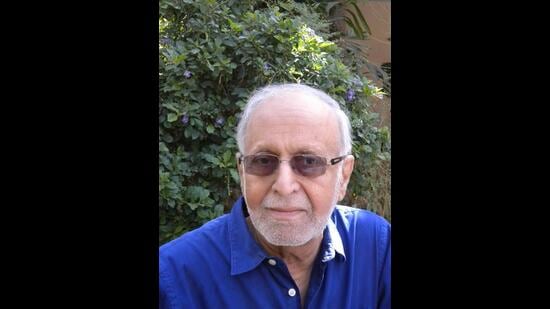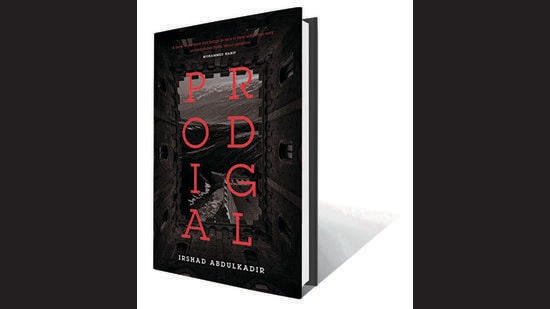Review: Prodigal by Irshad Abdulkadir
In ways more than one, Abkar Ali Samandar is chosen: by God, by family, and by faith. In Prodigal, Irshad Abdulkadir presents a microcosm of the eternal struggle – one man, many callings. Akbar is torn between education and dogma, between faith and people, between his duty to god and that to his fellow man. Like the blind seeker, he stumbles in the quest of that which he cannot see. Ricocheting between the classrooms of Cambridge, a madrassa in Karachi and the monastic lessons at Dar-ul Aman, Akbar’s quest is reminiscent of a lost genius haunted by the many ‘whys?’ he encounters. What Abdulkadir manages to convey – which is perhaps of prime importance in our troubling times – is the potential of knowledge, interpretation and that of narrative to be weaponised. In our current world of rigid opinion and blind obedience what Akbar champions is our ability to question, to question everything, especially that which is considered sacred.
The story begins with two boys, one running towards enlightenment the other running from his reality. Both share a dangerous ride in a cargo truck to the tribal areas of Khyber Pakhtunkhwa, previously known as FATA (Federally Administered Tribal Areas), a region controlled by the Taliban. Fate creates a steady bond between Akbar and Bairam, who go their separate ways. But we know their paths will cross again and they do. Each man at some point holds the fate of the other in his hands as he does of the other lives around him.
Abdulkadir presents a stark picture of how an individual’s faith affects and is in turn affected by those they hold close. Humanity and faith are inseparable, and both tend to poke their nose in the other’s business. By the end of the book he manages to convey the hold that old, dead words have on the living and the choice that each individual must make between those words and the living.
The author provides a student’s view of different styles of education contrasting between the madrassa, the Sufi-led Islamic research centre of Dar-ul Aman and Trinity college. This diversity is rare to find in a work of fiction. The author truly enjoys the academic dialogue between the inquisitive and unabashed disciple and the incredulous teachers and his writing reflects that. Readers might deem some sections esoteric and skip them but this reviewer found them illuminating.
While the protagonist Akbar is completely human and must undergo the human trials of relationships, family, love, loss, and betrayal, he is also chosen for transcendent, out-of-body experiences that bring him closer to the divine. Abdulkadir suspends Akbar between the world of mortals and that of the Gods, like a piece of metal between two magnets, pulled apart on both ends yet unable to move towards either. What follows is a poignant portrayal of his frustration; his fractured sense of self. The loss that Akbar feels when these visions and experiences stop and his shot-in-the-dark efforts to restart them make him a highly relatable character.

The strength of Prodigal lies in its unwavering devotion to curiosity, questioning, and the commitment to finding one’s path. The many betrayals of teachers and the dead ends of theosophy and theology do not stop Akbar. The loss of loved ones and the balancing act of fatherhood are all secondary to discovering divinity, a faith that he can truly follow without compromise. This is no small matter. In the end, the choice that Akbar makes about what to do and who to serve makes us look optimistically to the future. Abdulkadir must be lauded for the decisive ending he gives to Akbar’s quest. Prodigal would perhaps have been just as complete even if Akbar hadn’t chosen, but he does and does so well. This book will save young readers from much agony and heartache. In a world that forces people to choose sides, Prodigal revels in the journey that faith takes us on rather than in the end itself. There are many interpretations of old words; some of them are beautiful and worth preserving.
Percy Bharucha is a freelance writer and illustrator with two biweekly comics, The Adult Manual and Cats Over Coffee. Instagram: @percybharucha
In ways more than one, Abkar Ali Samandar is chosen: by God, by family, and by faith. In Prodigal, Irshad Abdulkadir presents a microcosm of the eternal struggle – one man, many callings. Akbar is torn between education and dogma, between faith and people, between his duty to god and that to his fellow man. Like the blind seeker, he stumbles in the quest of that which he cannot see. Ricocheting between the classrooms of Cambridge, a madrassa in Karachi and the monastic lessons at Dar-ul Aman, Akbar’s quest is reminiscent of a lost genius haunted by the many ‘whys?’ he encounters. What Abdulkadir manages to convey – which is perhaps of prime importance in our troubling times – is the potential of knowledge, interpretation and that of narrative to be weaponised. In our current world of rigid opinion and blind obedience what Akbar champions is our ability to question, to question everything, especially that which is considered sacred.

The story begins with two boys, one running towards enlightenment the other running from his reality. Both share a dangerous ride in a cargo truck to the tribal areas of Khyber Pakhtunkhwa, previously known as FATA (Federally Administered Tribal Areas), a region controlled by the Taliban. Fate creates a steady bond between Akbar and Bairam, who go their separate ways. But we know their paths will cross again and they do. Each man at some point holds the fate of the other in his hands as he does of the other lives around him.
Abdulkadir presents a stark picture of how an individual’s faith affects and is in turn affected by those they hold close. Humanity and faith are inseparable, and both tend to poke their nose in the other’s business. By the end of the book he manages to convey the hold that old, dead words have on the living and the choice that each individual must make between those words and the living.
The author provides a student’s view of different styles of education contrasting between the madrassa, the Sufi-led Islamic research centre of Dar-ul Aman and Trinity college. This diversity is rare to find in a work of fiction. The author truly enjoys the academic dialogue between the inquisitive and unabashed disciple and the incredulous teachers and his writing reflects that. Readers might deem some sections esoteric and skip them but this reviewer found them illuminating.
While the protagonist Akbar is completely human and must undergo the human trials of relationships, family, love, loss, and betrayal, he is also chosen for transcendent, out-of-body experiences that bring him closer to the divine. Abdulkadir suspends Akbar between the world of mortals and that of the Gods, like a piece of metal between two magnets, pulled apart on both ends yet unable to move towards either. What follows is a poignant portrayal of his frustration; his fractured sense of self. The loss that Akbar feels when these visions and experiences stop and his shot-in-the-dark efforts to restart them make him a highly relatable character.

The strength of Prodigal lies in its unwavering devotion to curiosity, questioning, and the commitment to finding one’s path. The many betrayals of teachers and the dead ends of theosophy and theology do not stop Akbar. The loss of loved ones and the balancing act of fatherhood are all secondary to discovering divinity, a faith that he can truly follow without compromise. This is no small matter. In the end, the choice that Akbar makes about what to do and who to serve makes us look optimistically to the future. Abdulkadir must be lauded for the decisive ending he gives to Akbar’s quest. Prodigal would perhaps have been just as complete even if Akbar hadn’t chosen, but he does and does so well. This book will save young readers from much agony and heartache. In a world that forces people to choose sides, Prodigal revels in the journey that faith takes us on rather than in the end itself. There are many interpretations of old words; some of them are beautiful and worth preserving.
Percy Bharucha is a freelance writer and illustrator with two biweekly comics, The Adult Manual and Cats Over Coffee. Instagram: @percybharucha
